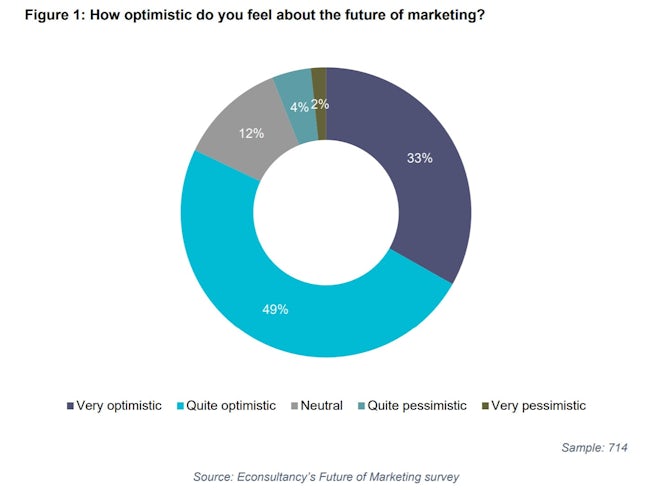All told, 82% of marketers say they are optimistic about the future of marketing – a third (33%) are “very” optimistic, while almost half (49%) are “quite” optimistic. Twelve percent were neutral on marketing’s future, leaving just 6% who are pessimistic (4% “quite”, and 2% “very”).
While learning ‘on the job’ shouldn’t be the only way to obtain vital skills, Duxbury does believe that there is value in an application-led approach. “It’s no good learning in a vacuum – you’ve got to really learn in live environments, so you can apply what you’ve learned, and learn even more by doing that.”
“I truly believe that it has shown us that we can do things we didn’t think were possible. It’s moved people to action quicker; it’s stopped prevarication and questioning, and I think it’s put people’s belief in change … front and foremost.”

Register now for free to watch the webinar on demand.
Alternatively, if you are an Econsultancy subscriber, you can download the presentation here.
Reasons to be optimistic
To kick off the discussion, the panellists shared some of the reasons they have to feel optimistic about the direction that marketing is taking.
Another audience member raised the question of whether face-to-face capability building is “dead”. Is digital learning here to stay, or will we see a return to the more traditional workshops of the pre-Covid-19 era?
Tony Miller responded that WW is looking to “find a happy medium” between virtual and physical learning and engagement going forward. “We’re going to understand how we use both virtual and physical together,” he said. “We’re really attuned to what our customers want … People are wanting that hybrid – people can only get a certain level of connection with community in a virtual environment, and people are going to want to see and interact with others in a physical environment to augment their full journey and experience.
“I think what’s lost in the digital space is that conversation; we’re trying to create communities and safe spaces to ask questions and clarify those learning points, which is really key. But I think the real world has still very much got its place.”
As Richard Robinson, MD of Econsultancy, highlighted as he opened Econsultancy’s quarterly intelligence briefing, ‘The Skills Dilemma 2022 – How can marketing cross the digital chasm?’, there is plenty for marketers to be optimistic about at present. The marketing jobs market is rebounding with a vengeance, with a 302% rise in opportunities for marketers in the six months to August 2021 compared with the same period in 2020, according to data gathered for Marketing Week by the job website Reed.
Leaning on internal expertise
“I think that peer-to-peer relationship is really important for people to learn from those in the agency who know digital first-hand and the practicalities of it.”
When putting a learning and training programme in place, one thing that can greatly aid uptake and engagement is drawing on subject matter experts within the company and providing an opportunity for them to mentor their peers, as both UPS and WW discovered.
However, this surge in opportunity is accompanied by a rise in pressure, with marketers expected to master a broader range of skills than ever before, from technical capabilities like ad serving to marketing fundamentals like strategy and brand building. How can organisations ensure that their marketers are equipped to tackle the varying demands of the role in 2021 and 2022, and evolve their skillset along with the changing times?
Robinson put this question to a panel of experienced marketing leaders: Anne Price, Director of Global Marketing Capabilities at UPS; Tony Miller, VP Growth & Performance Marketing at WW; Paul Duxbury, Programme Director of Repeatable Growth Model & Marketing Capability at GSK; and Emily Latham, Head of Digital Marketing and Martech at Channel 4. Here are some highlights from the discussion.
An audience question highlighted the disparity between the way that many organisations approach upskilling their sales department and their marketing teams, in that organisations will invest in sales training but expect to either be able to recruit marketers with the required skills or have them simply learn on the job.
Taking a planned approach to learning
“We have to recognise … what role [we] as an individual play within that, because there’s no point us all trying to do everything. It’s just not possible.”
“We have been able to feature 14 of our internal subject matter experts on everything from customer experience, data analytics, our own internal digital campaign planning tools; we have our own experts appear on camera around the world through this virtual experience,” said UPS’ Anne Price. “I think it’s really critical … it shows that we have digital expertise inside our company, and … that’s sending a signal – ‘This is important, and we have senior leaders who can talk the digital talk and walk the digital walk, and therefore you need to, too.’”
However, she echoed Miller’s points about the need for a community that will reinforce learning, something that is more challenging to recreate with digital training. “What we need to endeavour to do is create community and conversation around learning – how can we create a community … so that people don’t feel lonely when they’re learning? How can you create that time where you get people to ask questions?
Playing to marketers’ passions
“Time is the biggest challenge we have with all of this, and people are doing more than ever, and expected to be more than ever, so making it as easy and accessible for our teams as possible is really key.”
“The issue nowadays is that there is too much to know for anybody to possibly bring all of that knowledge, experience and skill with them,” said Paul Duxbury. “Things are going to change; the required skills are going to move on, and you’ll have to fill those gaps. [Learning by] osmosis isn’t going to do that – one has to take a planned approach, to say, ‘Where do we need to be? How are we going to get there? And what work are we going to do?’”
For Latham, the best way to go about learning and training as a marketer is to play to your passions, while maintaining an awareness of the broader set of skills required. “For me, it’s about playing to people’s strengths – people being super clear about where their passion plays, and playing to that spike of talent. What is your passion? What lights you up? Is it performance marketing, is it data and analytics, is it brand marketing? Let that be the area of expertise that you focus on – but have an appreciation of the wider taxonomy, because ultimately, all of this comes back to the importance of the connected customer experience.
Creating community and conversation in online learning
“I think that’s been reflected in the way that we approach learning, and the journey we’re on to move from traditional, instructor-led training to much more progressive, resource-based problem-solving, learning and development has been accelerated.”
Channel 4’s Emily Latham similarly struck a note of hope and change as she reflected on the past year and a half. “Covid has put us into a parallel universe – would we have been in the same position eighteen months ago? Would we be as far ahead as we are today, and having these progressive conversations?
“One of the impacts of the pandemic is that we’ve got more open to change,” said GSK’s Paul Duxbury, who describes himself as an “optimist by nature”. “Things that we believed would never happen now happen very easily.
“Face-to-face is not dead, and I think it’s coming back – with caution, and with a renewed insight into how the two worlds will work together to drive business forward,” he concluded.
Econsultancy’s Future of Marketing survey, which canvassed close to 1,000 client, vendor and agency-side marketers on their predictions about the future of the industry, revealed that an overwhelming majority of marketers feel optimistic about their future.
“What does that mean for us internally, and for our staff? It’s about focusing on their individual needs and their learning development,” he said. “Every person is unique, and every person is on a different process … [it helps] to have the internal curriculum support that we have to hand through partners like Econsultancy … and also rely on the mentorship of people who are experts in the business spending time with those who need to know more and be upskilled.
Despite the increasing pressure for marketers to be all-singing and all-dancing, Emily Latham argues that there is still a need for specialisation. “Not everyone can be everything. We have to have brand marketeers – they’re very important, and they will stay being important – and we need digital marketeers.”
Tony Miller reflected on the challenges that came with the shift from carrying out 70% of WW’s check-ins and touchpoints in person to carrying out 70% of them in the virtual arena.




![[CRO Test Idea] “Your Order is Corona Safe” eCommerce Banner](https://research-institute.org/wp-content/uploads/2021/03/cro-test-idea-your-order-is-corona-safe-ecommerce-banner-768x479.jpg)

